Lamar Allen, left, and his father, Glynn Sherwood Gaston Jr.
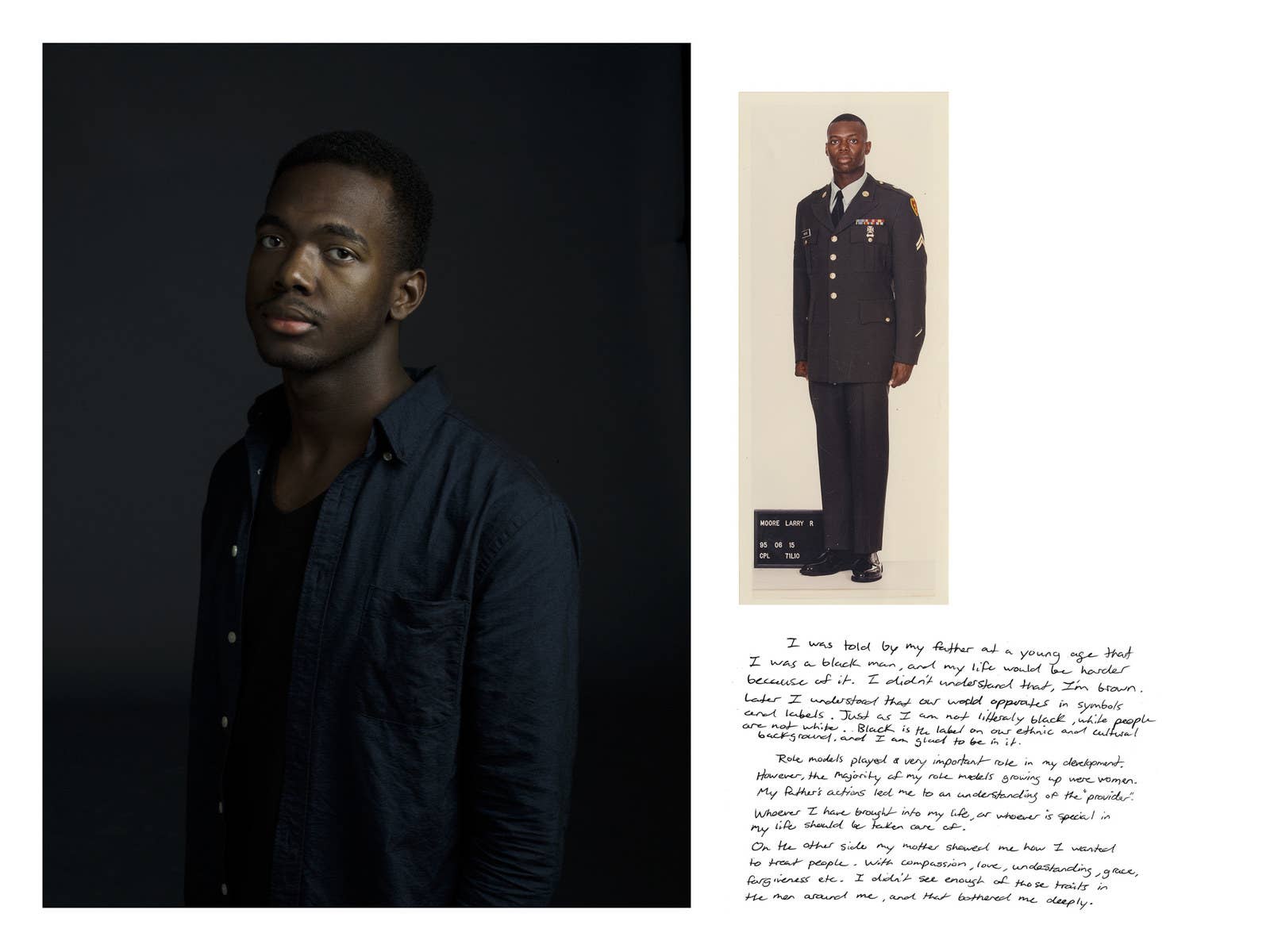
Joshua Rashaad McFadden’s Come to Selfhood is a photo series that grapples with the definition of what masculinity means for black men in America today. Through a series of striking portraits, accompanied by old family pictures and handwritten testimony, McFadden’s aim is to open an honest conversation that breaks through stereotypes that have long perpetuated myths of black masculinity.
This ongoing series took shape after national headlines began calling attention to the frequent killings of unarmed black men by police officers across the country. “When Trayvon Martin was murdered in 2012, I truly understood what my father has always said about living as a black man in America,” McFadden told BuzzFeed News. “Then Michael Brown was unjustly killed by police in 2014. I was moved into creating work not only about comparing the Black Lives Matter movement to the civil rights movement of the ’60s, but also perceptions of African Americans. This project came from a moment of questioning my own identity and wrestling with societal perceptions of black men.”
Representation and honesty has become a vital component to McFadden’s art practice. “I hope people are able to look at the images and see themselves,” he said. “I need people to see their sons, their brothers, and fathers. Everyone should be able to empathize with the narratives. Most of all I’d love the work to spark decisive action.”
Here, McFadden shares with BuzzFeed News a selection of images and words from his ongoing series Come to Selfhood.
Jeremiah Thompson, left, and his father, Joseph Thompson Sr.
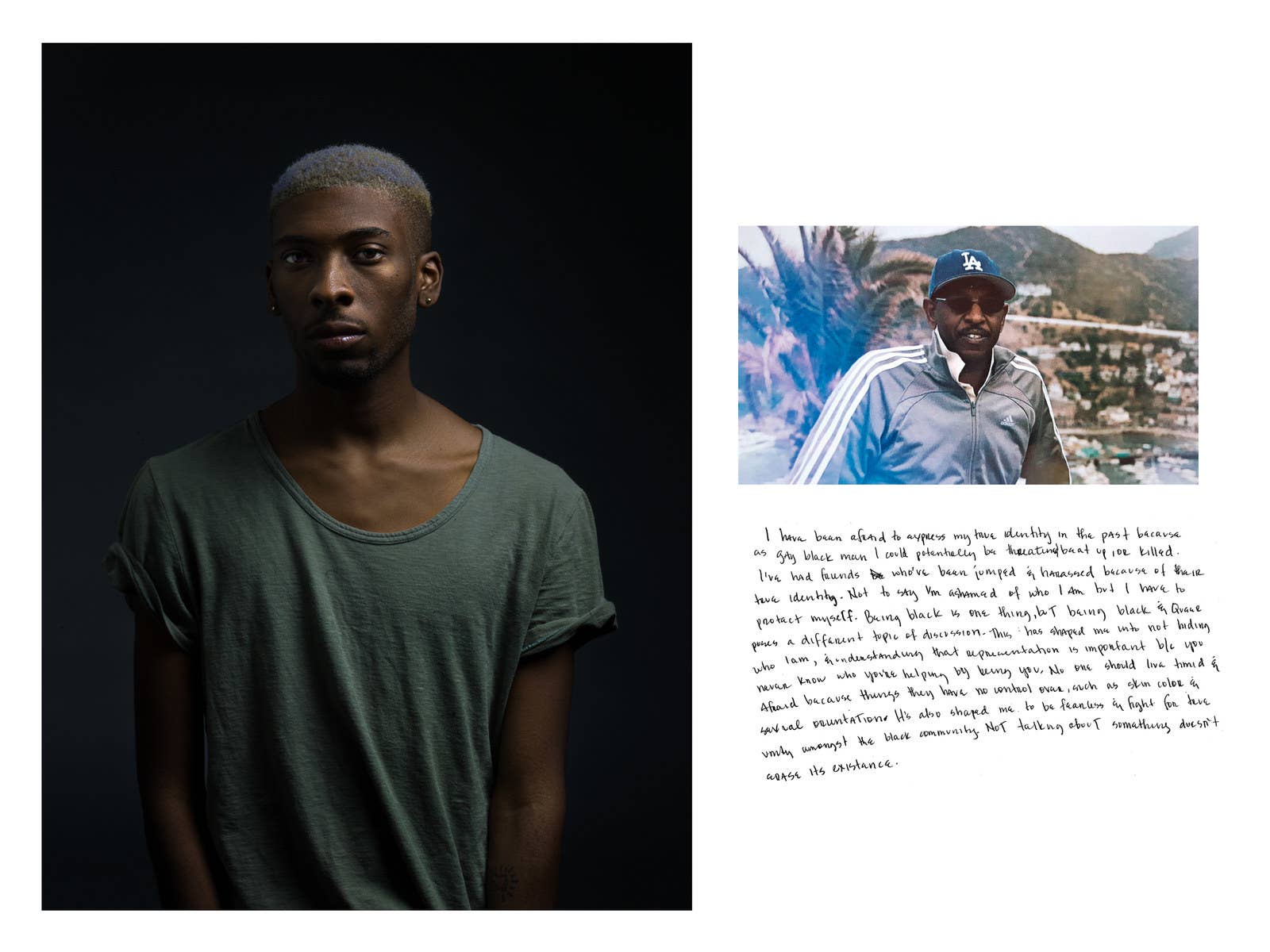
“I have been afraid to express my true identity in the past because as a gay black man I could potentially be threatened, beat up, or killed. I’ve had friends who’ve been jumped and harassed because of their identity. Not to say I’m ashamed of who I am but I have to protect myself. Being black is one thing, but being black and queer poses a different topic of discussion. This has shaped me into not hiding who I am, and understanding that representation is important because you never know who you are helping by being you. No one should live timid and afraid because [of] things they have no control over, such as skin color and sexual orientation. It’s also shaped me to be fearless and fight for true unity amongst the black community. Not talking about something doesn’t erase its existence.”
—Jeremiah Thompson
Johnathan Marshall, left, and his father, John Marshall.
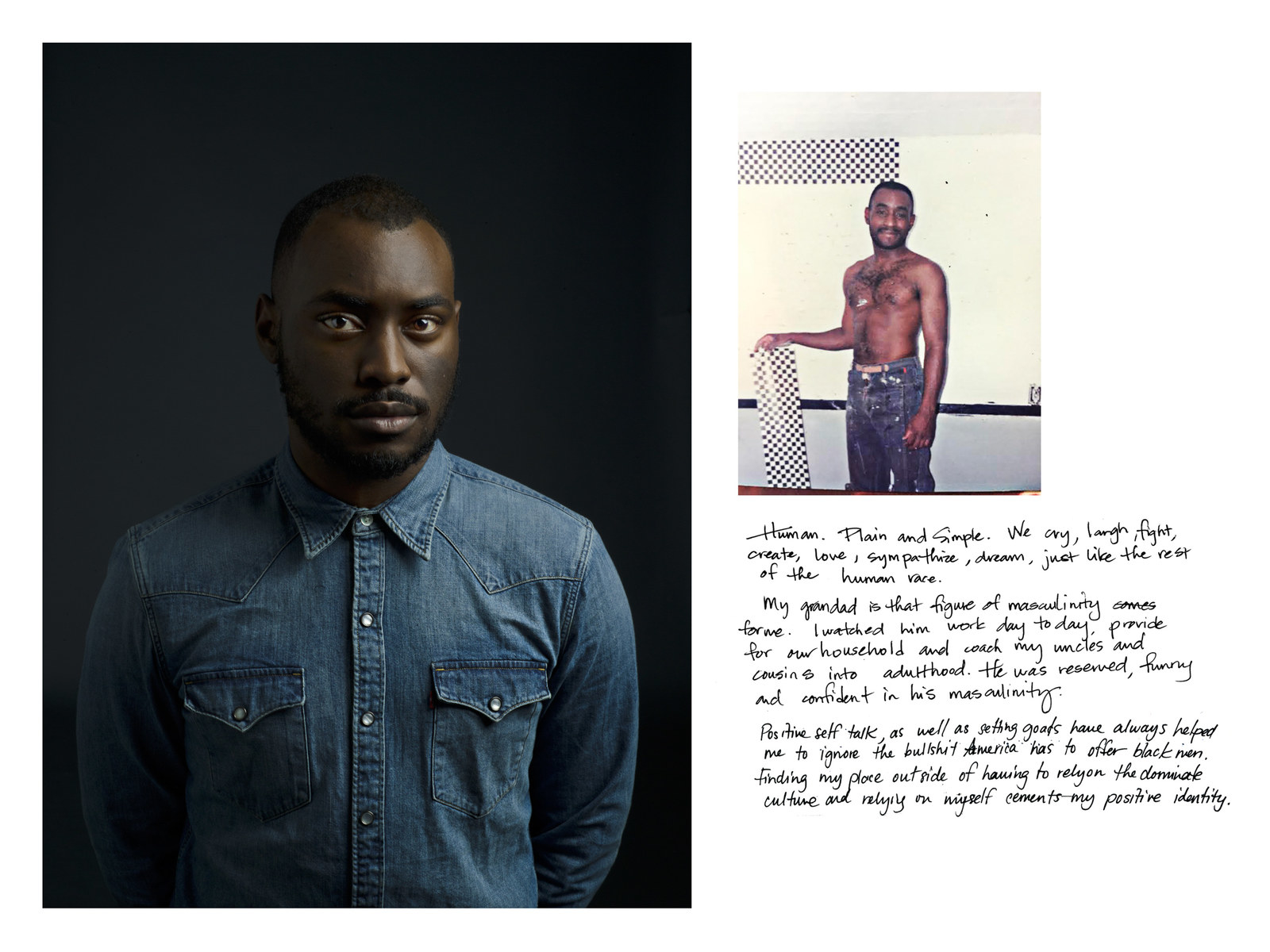
“Human. Plain and simple. We cry, laugh, fight, create, love, sympathize, dream, just like like the rest of the human race.
“My granddad is that figure of masculinity for me. I watched him work day to day, provide for our household and coach my uncles and cousins into adulthood. He was reserved, funny and confident in his masculinity.
“Positive self talk, as well as setting goals have always helped me to ignore the bullshit America has to offer black men. Finding my place outside of having to rely on the dominant culture and relying on myself cements my positive identity.”
—Johnathan Marshall
Jonathan Magee, left, and his father, Willace Demetris Magee.
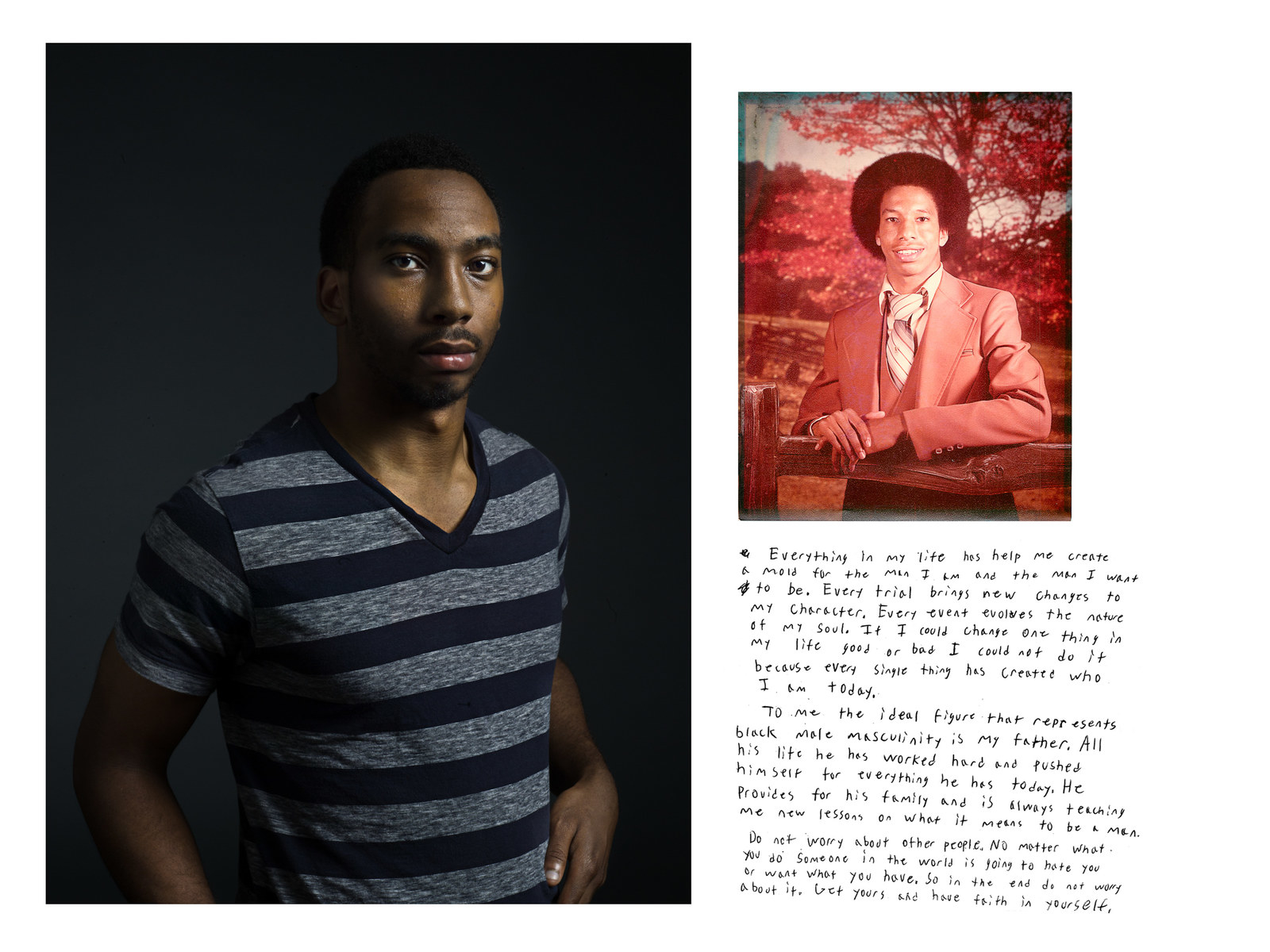
“Everything in my life has help[ed] me create a mold for the man I am and the man I want to be. Every trail brings new changes to my character. Every event evolves the nature of my soul. If I could change one thing in my life good or bad I could not do it because every single thing has created who I am today.
“To me the ideal figure that represents black male masculinity is my father. All his life he has worked hard and pushed himself for everything he has today. He provides for his family and is always teaching me new lessons on what it means to be a man.
“Do not worry about other people. No matter what you do, someone in the world is going to hate you or want what you have. So in the end do not worry about it. Get yours and have faith in yourself.”
—Jonathan Magee
Jamel Jones, left, and his father, James Jones.
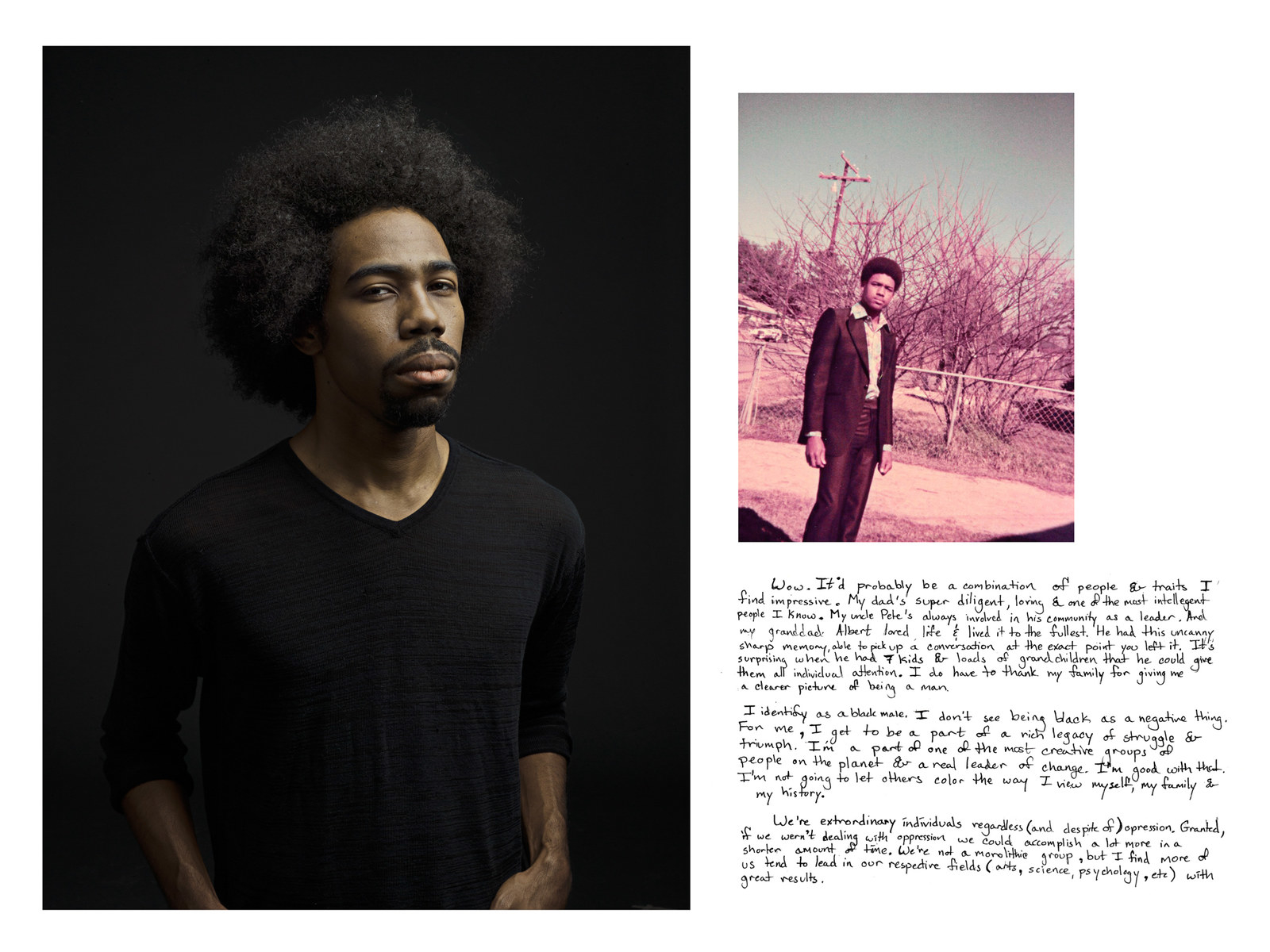
“Wow. It’d probably be a combination of people and traits I find impressive. My dad’s super diligent, loving and one of the most intelligent people I know. My uncle Pete’s always involved in his community as a leader. And my granddad Albert loved life and lived it to the fullest. He had this uncanny sharp memory, able to pick up a conversation at the exact point you left it. It’s surprising when he had seven kids and loads of grandchildren that he could give them all individual attention. I do have to thank my family for giving me a clearer picture of being a man.
“I identify as a black male. I don’t see being black as a negative thing. For me, I get to be a part of a rich legacy of struggle and triumph. I’m a part of one of the most creative groups of people on the planet and a real leader of change. I’m good with that. I’m not going to let others color the way I view myself, my family and my history.
“We’re extraordinary individuals regardless (and [in spite] of) oppression. Granted, if we weren’t dealing with oppression we could accomplish a lot more in a shorter amount of time. We’re a monolithic group, but I find more of us tend to lead in our respective fields (art, science, psychology, etc) with great results.”
—Jamel Jones
Matt Cornwall, left, and his father, David Alexander Cornwall.
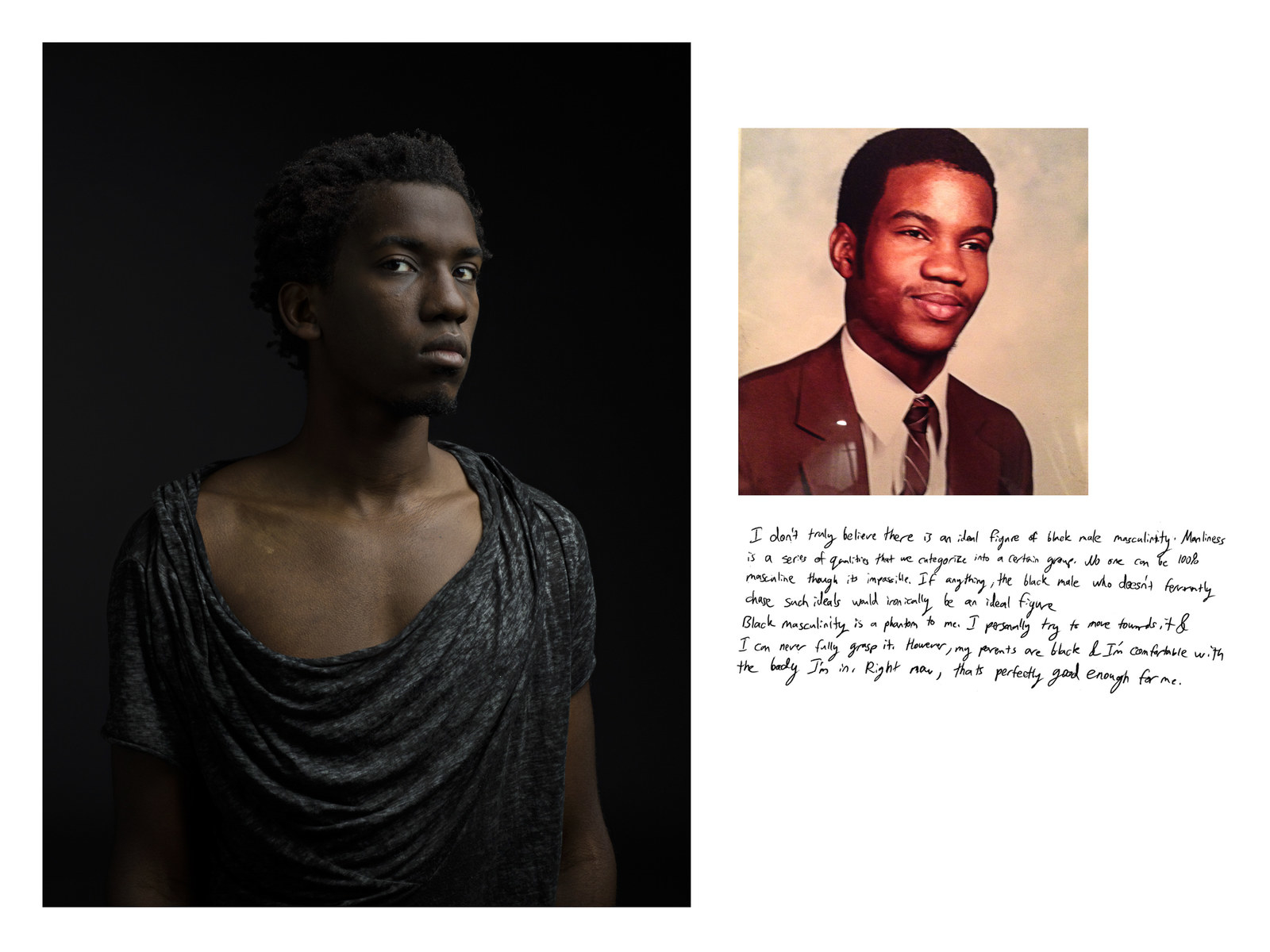
“I don’t truly believe there is an ideal figure of black male masculinity. Manliness is a series of qualities that we categorize into a certain group. No one can be 100% masculine though, it’s impossible. If anything, the black male who doesn’t fervently chase such ideals would ironically be an ideal figure.
“Black masculinity is a phantom to me. I personally try to move towards it and I can never fully grasp it. However, my parents are black and I’m comfortable with the body I’m in. Right now, thats perfectly good enough for me.”
—Matt Cornwall
Cameron Goins, left, and his father, Keith Goins.
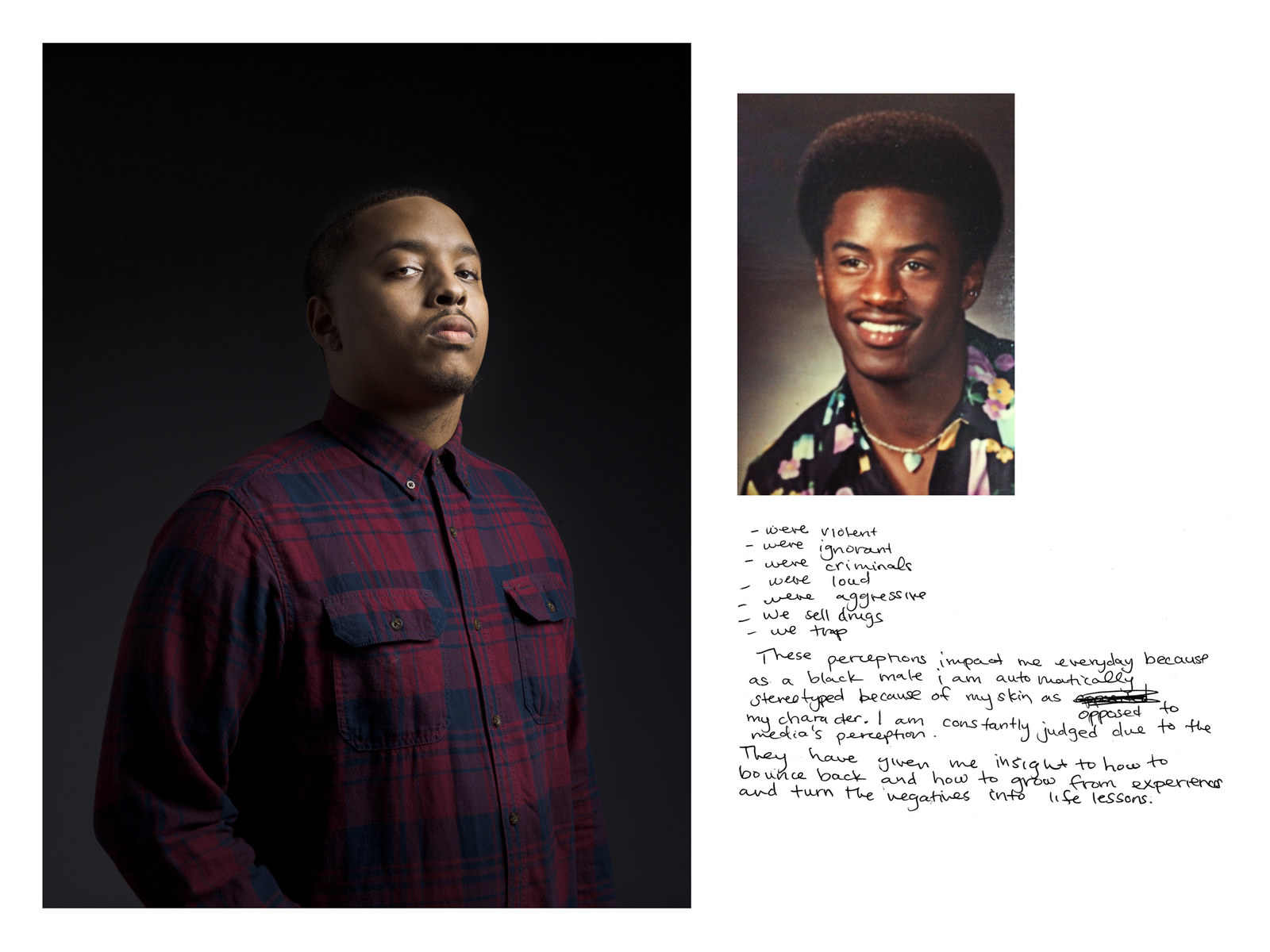
“We’re violent, we’re ignorant, we’re criminals, we’re loud, we’re aggressive, we sell drugs, we trap. These perceptions impact me every day because as a black male I am automatically stereotyped because of my skin as opposed to my character. I am constantly judged due to the media’s perception. They have given me insight to how to bounce back and how to grow from experiences and turn the negatives into life lessons.”
—Cameron Goins
Christian Cody, left, and his father, Ywahnos Cody.
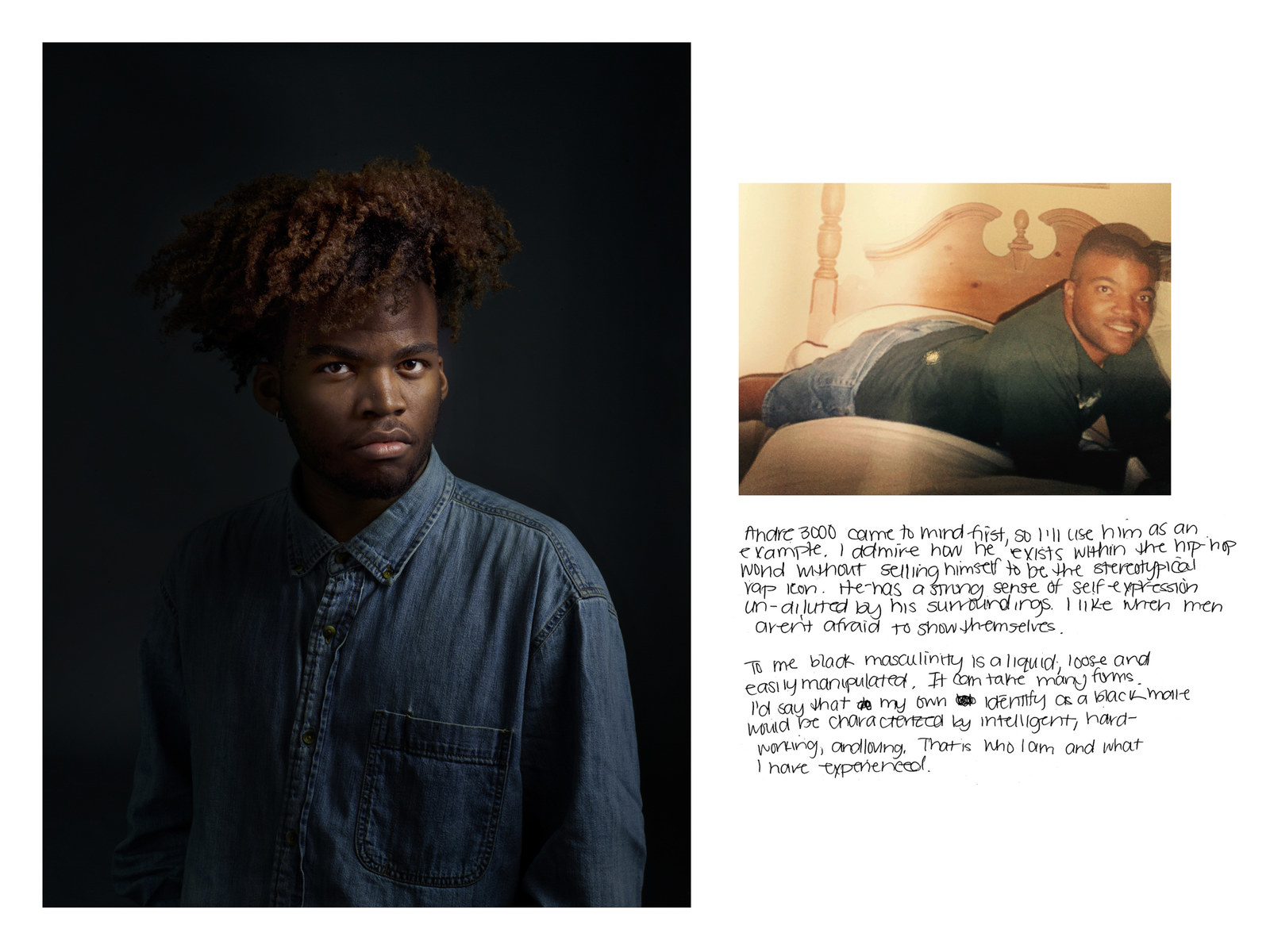
“André 3000 came to mind first, so I’ll use him as an example. I admire how he exists within the hip-hop world without selling himself to be the stereotypical rap icon. He has a strong sense of self expression undiluted by his surroundings. I like when men aren’t afraid to show themselves. To me, black masculinity is a liquid, loose and easily manipulated. It can take many forms. I’d say that my own identity as a black male would be characterized by intelligent, hard-working, and loving. That is who I am and what I have experienced.”
—Christian Cody
Marcus McFadden, left, and his father, Craig McFadden.
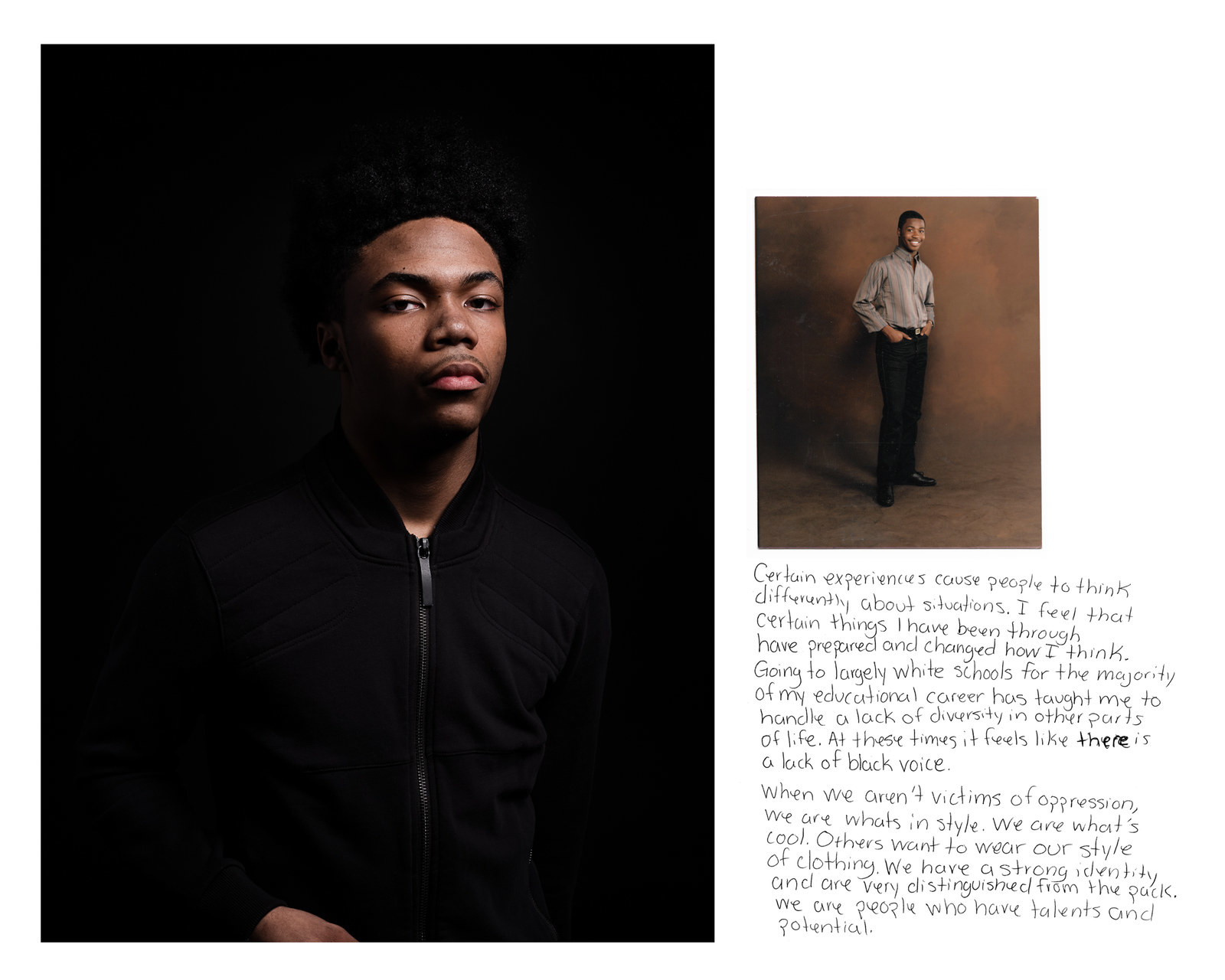
“Certain experiences cause people to think differently about situations. I feel that certain things I have been through have prepared and changed how I think. Going to largely white schools for the majority of my educational career has taught me to handle a lack of diversity in other parts of life. At these times it feels like there is a lack of black voice.
“When we aren’t victims of oppression, we are what’s in style. We are what’s cool. Others want to wear our style of clothing. We have a strong identity and are very distinguished from the pack. We are people who have talents and potential.”
—Marcus McFadden
